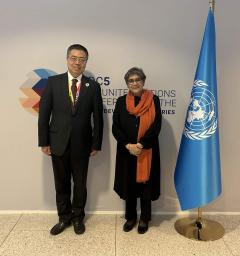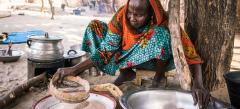The LDC Category
The LDC category was established by the UN General Assembly in 1971 as an acknowledgment by the international community that special support measures were needed to assist the least developed among the developing countries.
The United Nations defines LDCs as countries that have low levels of income and face severe structural impediments to sustainable development.
LDC CRITERIA:
- Income: Countries must have an average per capita income of below USD$1,018 for inclusion, and above USD$1,222 for graduation;
- Human Assets: Countries must also have a low score on the Human Assets Index, a tool that measures health and education outcomes, including under-five mortality rate, maternal mortality, adult literacy rate and gender parity for secondary school enrolment;
- Economic and Environmental Vulnerability: Countries must score high on the Economic and Environmental Vulnerability Index, which measures factors like remoteness, dependence on agriculture and vulnerability to natural disasters.
For more information on these measurements, visit the website of the Secretariat (DESA) of the Committee for Development Policy (CDP)
INCLUSION: To be classified as an LDC, a country must satisfy all three criteria and agree to the classification. Today, 46 countries are classified as LDCs.
GRADUATION: To be eligible for graduation, a country must reach thresholds in two of the three criteria in two consecutive triennial reviews by the Committee for Development Policy. Alternatively, a country may graduate based on the income-only criterion. To read more about the graduation process, see here.
Benefits available to LDCs
These 46 countries benefit from exclusive international support measures (ISMs) in the areas of trade, development cooperation and participation in international organisations and processes.
Examples of such measures in the area of trade include: preferential market access for goods (such as the EU EBA Initiative) and services; special treatment under World Trade Organisation rules and certain regional trade agreements; and technical assistance and capacity building.
Other ISMs include a range of financial and technical assistance provided by multilateral and bilateral partners, such as special programmes and budget allocations at the UN, including the Technology Bank for LDCs, and the LDC Fund established by the United Nations Framework Convention on Climate Change (UNFCCC).
Other support measures help LDCs participate in international forums, such as caps and discounts on contributions to the budget of the United Nations and financial support for representatives of LDCs to travel to General Assembly and other meetings.
Another measure is the Investment Support Programme (ISP) for LDCs, which was jointly designed by the International Law Organization (IDLO) and UN-OHRLLS. The Programme provides on-demand legal and professional technical advice and assistance to LDCs on investment-related negotiations and dispute settlement and provides capacity building in these areas. A first project was concluded successfully and led to a favorable arbitration outcome for The Gambia in 2020. With currently 30 law firms on the roster, support and advice are provided pro bono or via reduced-fee assistance.
Graduation from the LDC Category
The 2011 Istanbul Programme of Action set an ambitious goal that half of the countries classified as LDCs should meet the criteria for graduation by 2020. It was the first time that the international community had adopted an explicit target for graduation. This has only been partially met but since 2018 a growing number of LDCs have been meeting the criteria and are expected to graduate out of the LDC category during the next decade.
The list of countries categorized as LDCs is reviewed by the United Nations every three years based on specific procedures. For more on the graduation process see here.
There are currently 16 LDCs in various stages of the graduation process, four of which are due to graduate soon:
-
Bhutan is due to graduate on 13 December 2023
-
Angola is due to graduate on 12 February 2024
-
Solomon Islands is due to graduate on 13 December 2024
-
Sao Tome and Principe is due to graduate on 13 December 2024
Other LDCs in the graduation pipeline are:
- Bangladesh (recommended for graduation by CDP)
- Lao PDR (recommended for graduation by CDP)
- Nepal (recommended for graduation by CDP)
- Kiribati (recommended for graduation by CDP)
- Tuvalu (recommended for graduation by CDP)
- Myanmar (deferred to 2024 by CDP)
- Timor-Leste (deferred to 2024 by CDP)
- Cambodia (met criteria for first time 2021)
- Comoros (met criteria for first time 2021)
- Djibouti (met criteria for first time 2021)
- Senegal (met criteria for first time 2021)
- Zambia (met criteria for first time 2021)





